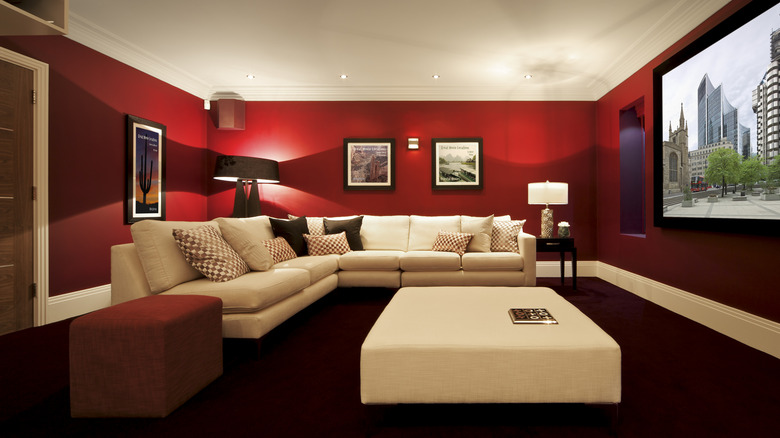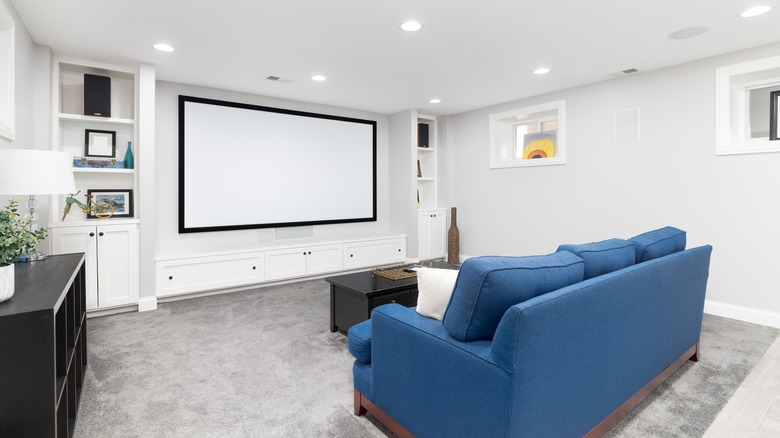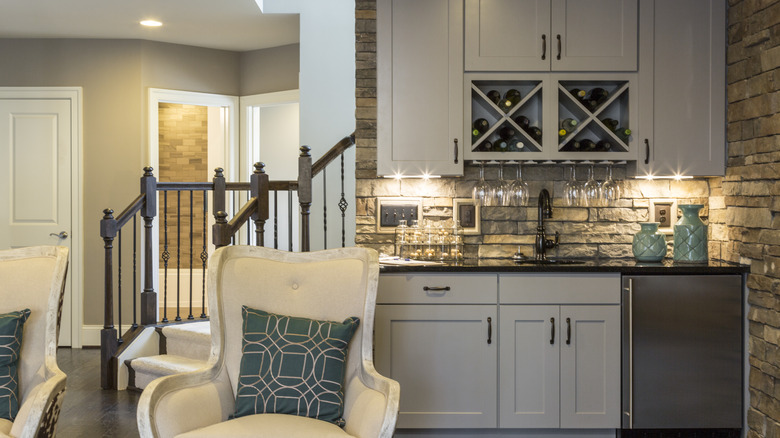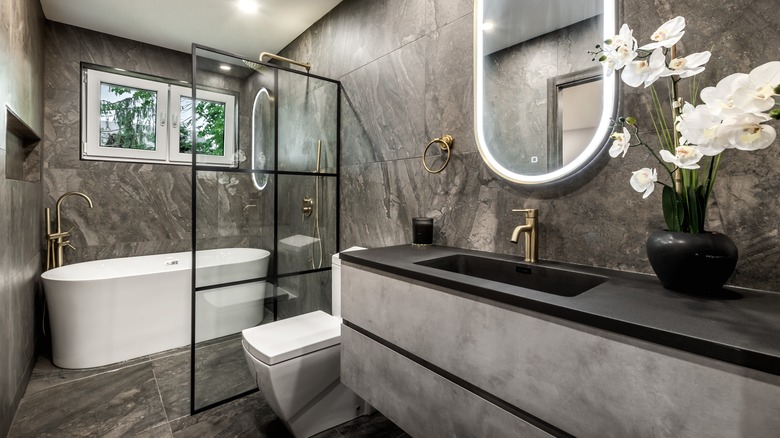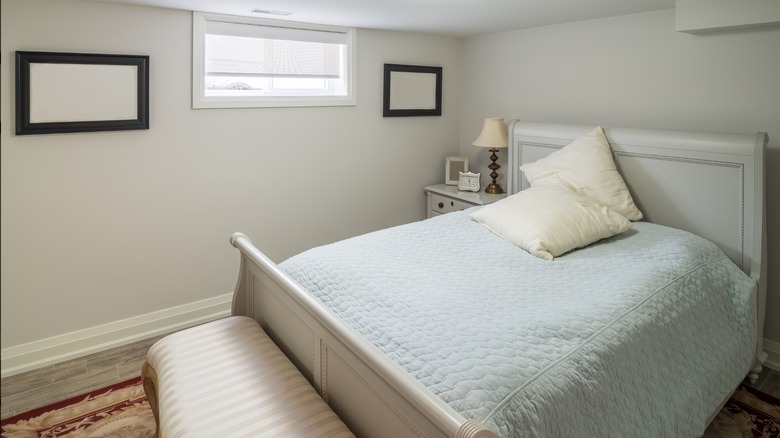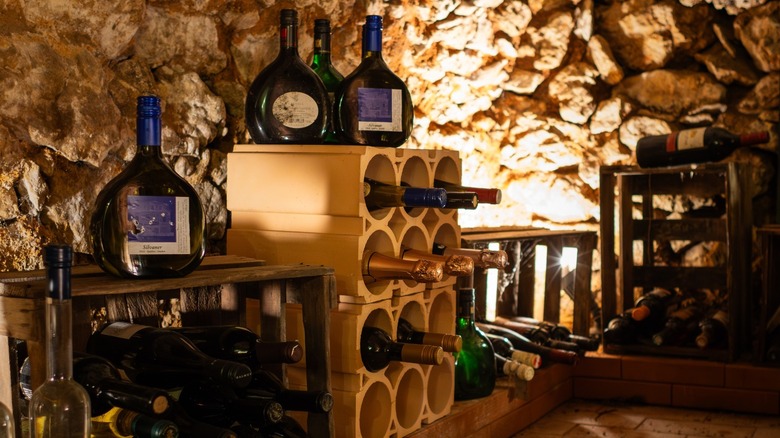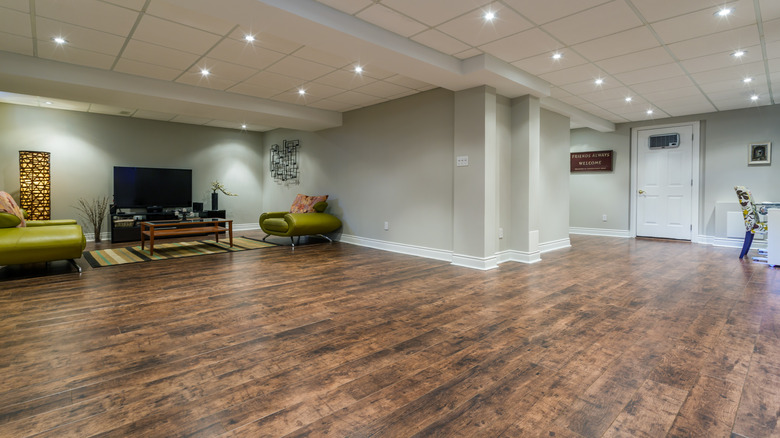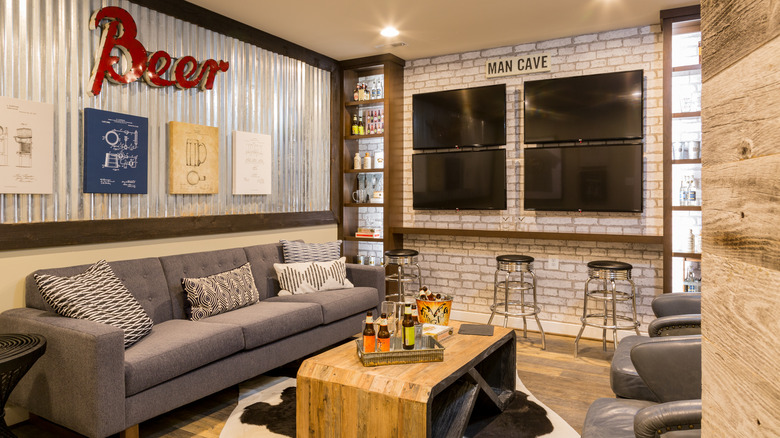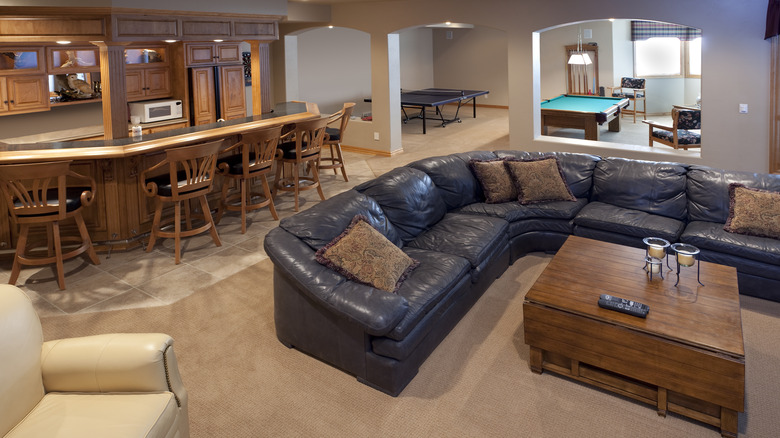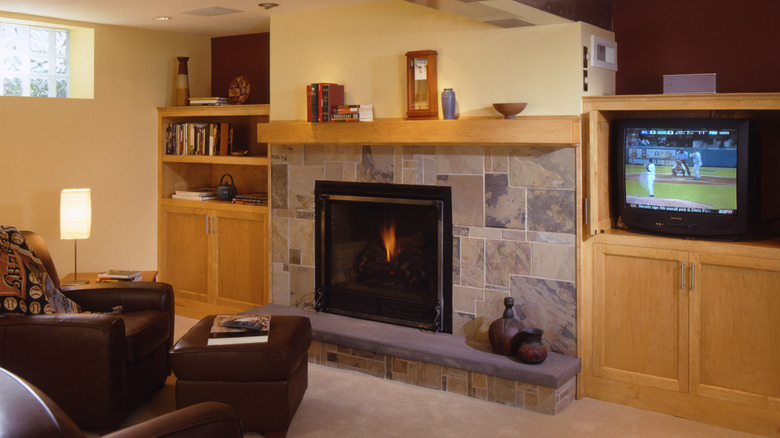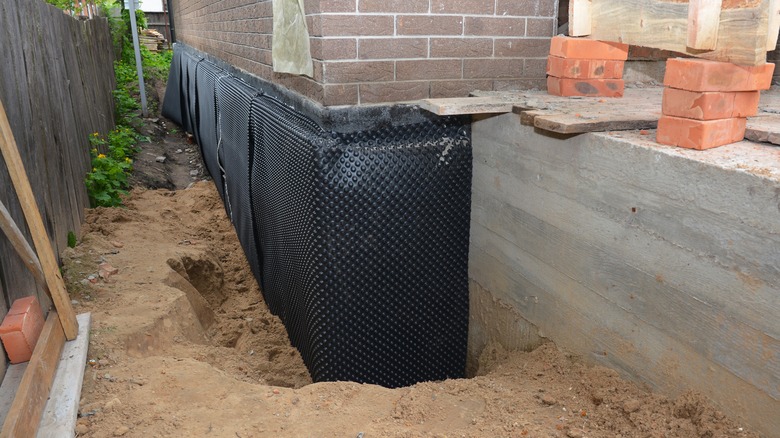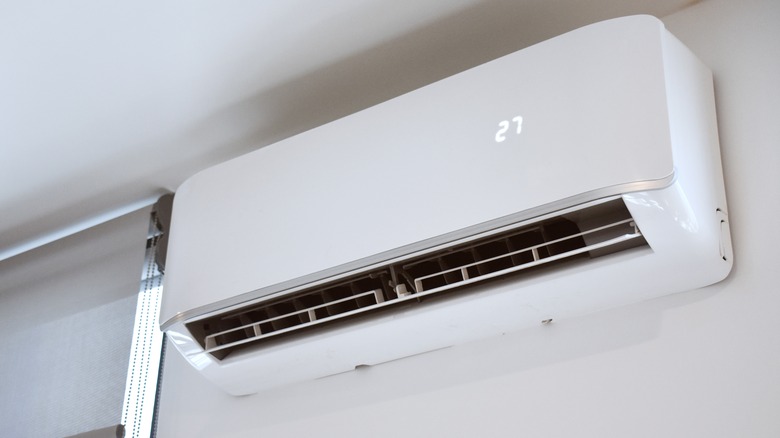Popular Basement Upgrades That Just Aren't Worth The Price
Your basement has the potential to be so much more than an ad hoc storage space. For example, it can be transformed into an entertainment area, a makeshift guest or laundry room, or a play zone. Besides adding value to your home when it's time to sell, it also makes the home more functional and livable. In fact, the 2022 Remodeling Impact Report revealed that homeowners had a sense of accomplishment and enjoyment after renovating their basements into spaces that fit their preferences despite recouping only 86% of their investment.
Regrettably, not all basement remodeling ideas can provide the best bang for your buck. To illustrate, upgrades like opulent home theaters are often reduced to cushy nap pods. Similarly, custom wine cellars, luxe bathrooms, and wet bars are all options that should be nixed if your main goal is ROI. Remember, if you've plans to move out eventually, stick to practical, mid-range basement upgrades and avoid over-personalization to appeal to a broader range of buyers. Need practical examples regarding the upgrades you should skip for your basement? House Digest spoke to five real estate experts and professional home flippers to see which basement upgrades just aren't worth the price.
Outfitting your basement with a home theater has limited appeal
Wouldn't it be nice to enjoy a Hulu-curated midnight movie marathon without being concerned about waking the kids? Or to watch game replays without worrying about disrupting the entire neighborhood? What better idea than building a home theater in the unused basement? It's dark and cozy, perfectly enhancing the vibe for movies and games alike. It's also money down the drain (literally). "While a home theater can seem like a luxurious addition, it tends to have a low ROI (return on investment)," explains Jolean Olson, real estate agent at Olson Home Buyers, in an exclusive interview with House Digest. Per her experience, the national average ROI for high-end home theaters tends to be around 65-70%. In short, "You may not recoup the full investment when selling the home."
High-end home theaters are expensive, sometimes costing $200 per square foot — that's $60,000 for a 300-square-foot basement. Imagine losing 30% of it! "The cost of specialized seating, soundproofing, and advanced audio-visual equipment can be substantial, but this feature often appeals to a limited buyer pool," she explains. While you might have enjoyed the custom built cabinets, professionally installed soundproofing, and expensive reclining sofa with cup holders, chances are most buyers won't want to pay the premium on the listing price for those things when it's time to sell.
Wet bars or kitchens aren't your best bet on basement remodeling
If doing the rounds of every tiki bar in your vicinity is your passion, but last calls are playing spoilsport, you've probably convinced yourself it's time to build your own wet bar. Though remodeling a small basement will fulfill your lifelong dream of owning a bar and keep your intoxicated friends from entertaining the pub crowd with their joyful singing, it's unlikely to raise your home's resale value. Kevin Daniels, professional house flipper and owner of Palm State Home Buyers, shares, "Another upgrade that homeowners frequently regret is adding a wet bar. While stylish, they are expensive to install, often requiring plumbing, cabinetry, and appliances. The cost versus the benefit just doesn't stack up, as wet bars don't significantly increase a home's resale value."
Indeed, wet bars could eat up to $30,000 of your budget, depending on installation requirements, labor costs, and whether you've gone the pre-fab or customization route. Olson chimes in that basement kitchens (aka kitchenettes) can also be lumped into this category for similar reasons. "Plumbing and electrical work doesn't always justify the added value, limiting the ROI to about 50-60%." This might not seem like a good trade-off, considering the time-consuming process of applying for multiple permits under local zoning laws. But why are homeowners losing money on such upgrades, let alone failing to earn premiums? Daniels notes, "Many buyers don't see a bar as a 'must-have' and might even view it as a waste of space, especially if they prefer to use the basement for storage or a playroom
Luxury bathrooms and basements are a poor match
Space constraints and layout plans can often wreak havoc on our plush dreams, with master or full bathrooms taking the biggest hit, forcing homeowners to stick to the basic shower-tub combination as opposed to creating the perfect spa-like bathroom. The way out? Opulent basement bathrooms! But be warned, they're expensive and are unlikely to offer a significant return. Olson elaborates, "Adding a luxury basement bathroom can be expensive due to plumbing modifications and premium fixtures. However, the ROI for basement bathrooms is often lower than for main-floor or master bathrooms. You might see a 60-70% ROI on this investment, depending on the overall appeal of the home."
Assuming you've received the go-ahead from your local zoning departments and counties for the construction, you must also account for plumbing and drainage costs. Ideally, if your sewer lines run deep enough (meaning beneath the basement floor), you're roughly looking to spend over $9,000 on fixtures, reinforcements, and framing. But if your sewer lines run higher — which is the case for most — your expenses will multiply as you must grapple with installing pump fixtures or other underground disposal systems. Waterproofing the damp-keeping basement floor and plumbing modifications are other problems you wouldn't face in above-floor bathrooms. All this adds up, but doesn't necessarily add value.
Converting basements into rental units is a no-go
Owning a basement rental could be a homeowner's dream because of the monthly cash inflows that can either offset mortgage payments or raise passive incomes. On the flip side, they help take some of the edge off the acute housing crisis, aiding people in their house-hunting when prices are through the roof. But they aren't the type of basement upgrades that justify their price. "Turning a basement into a full rental unit is frequently regretted due to the high cost of compliance with local building codes," Olson explains.
That's assuming such apartments are allowed by the municipality. With flash floods becoming a norm rather than a rarity courtesy of the worsening climate crisis and the age-old fire hazards, local and state governments have resorted to outlining several building requirements to ensure safety. For instance, NYC requires adherence to the housing maintenance code, necessitating a minimum of 7 feet for ceiling height and water-proof walls. Other states may require "more egress windows, separate entrances, and electrical upgrades," Olson notes. All in all, you can expect to cough up at least $61,000 on such renovations, going up to $120,000. That being said, even if the economics worked out for you, homebuyers may not be too keen on continuing the practice. "It's also not appealing to all buyers, as many prefer the additional living space for personal use. The long-term cost of maintaining a rental unit often outweighs the benefit at resale."
Custom wine cellars in the basement have poor ROI
HGTV's Dave & Jenny Marrs' hidden wine cellar reveal might've left you hoping for your own custom vault in the basement, but hold your reins for a red-hot minute because it might not be the brightest idea. Olson shares, "While a wine cellar might be a dream for some, it is a niche feature." In other words, not many buyers are vying to account for the premium feature in their offer price — wine racks do just fine, please and thank you.
Although basements, with their cold and dampness, do offer a favorable environment to store and age wines, you'll have to incur high costs before it serves as a functional wine cellar. Because of this, this feature is best left to up-and-coming sommeliers and serious collectors like Damon Salvatore from "The Vampire Diaries." Olson agrees, "As basement cellars require temperature control and specialized storage, they tend to be costly to install." Proper insulation, climate control equipment, and finishing can cost $33,750 on average, which may go higher if the basement is unfinished, premium quality materials are used, and the number of wine bottles is significant. As a result, "The ROI sits at around 50-60%, as most don't see much practical benefit."
Upscale flooring has little utility in basements
You might be tempted to make your basement as upscale and aesthetic as the rest of your house by installing high-end flooring, but you likely won't see much of that money back when it's time to sell. This is because certain flooring materials aren't worth the price, no matter how pretty.
For starters, most basements are below-grade (as they're situated lower than the curb level) and have concrete for the base. As such, installing wooden flooring will be quite tricky without adding another sub-floor in between for a better hold. But even if you did, you must watch for floor damage. "Many homeowners choose to install luxury flooring materials in their basement, such as hardwood or marble. However, basements are prone to moisture, which can lead to warping or cracking, resulting in high maintenance costs," Olson explains. That's because hardwood wicks moisture off the concrete slab and expands (or retracts) in tandem with the changing conditions. In case you live in an area prone to flooding, the hardwood floors will get damaged and invite mold that can be hard to treat. Another reason high-end floors are a poor choice for basements is that "they don't appeal to all buyers in a basement setting," points out Olson. Thus, she recommends using cheaper options like vinyl or engineered wood that closely mimic the hardwood floor appearance yet are low-maintenance.
Making your basements smart is trendy but won't offer a significant ROI
Not having to flip light switches as you climb down the stairs to reach your basement or check door locks after a long gaming session might make a case for integrating smart home technologies into your media room. Or, you might want a smart mirror in your basement bathroom or install a smart shower head to regulate temperature without you having to tweak anything. The smart tech may also warn about a basement leak or the HVAC turning faulty. Yet, installing such hardware in your basement might just be overkill. "Fully automating a basement with smart lighting, sound systems, and climate control can be impressive but expensive to install and maintain," Olson notes.
While it's challenging to predict how expensive it can get since homeowners experiment with different DIY tech, custom, or subscription options unless they're fully immersed in the Apple ecosystem, the chief point of contention is the long-term utility — or the lack of it. "As the technology evolves quickly, the future buyers may not place the same value on these systems, resulting in maintenance costs that aren't offset by long-term value," she explains. Moreover, potential buyers may feel daunted by the idea of navigating through the established systems, preferring instead to go for homes sans such sophistication.
Don't expect substantial returns from basement man caves
The stereotype that the main house is teeming with feminine energy, has pushed the more masculine underground into something called "man caves." "The Sopranos" and Super Bowl commercials didn't help, either. Usually set up as recreational spaces in garages, sheds, or separate rooms, homeowners have taken to turning their basements into man caves where they sit and ponder on their lives, host game parties, or chill with their friends. Usually, they're thematic, with the space screaming out loud the things it's good for, say, a hunting lounge to display trophies or an entertainment zone with shuffleboard, pinball, and arcade tables. In short, they're highly personalized, spelling their downfall in ROI terms.
Harpreet Saini, the CEO of We Buy Houses in Metro Detroit, experienced something similar when her partner designed custom man caves in flipped home basements. "My partner is a big sports guy, so on the first few flips we did, he over invested in something he thought everyone wanted: custom man caves in the basement. We spent around $40,000 on designing a perfect hangout spot for guys to play pool, ping pong, and watch sports. The only problem was we didn't actually see an equal rise in appraisal price," he exclusively shared. Clearly, not everyone sees the same value in such bespoke spaces. "I highly recommend not to go overboard on things you feel an emotional attachment to. Stay objective and don't do things custom because you will go over budget and it may not have the ROI you expected."
You might regret adding wall-to-wall carpeting
Wall-to-wall carpets are warm and snug, while basements are glum and moist. So, pairing the two should be the perfect recipe to brighten and lighten your subterranean floor, right? Perhaps not, as Robert Fausette, founder and CEO at Revival Homebuyer, shares. "One popular basement upgrade that often proves impractical is the installation of wall-to-wall carpeting. It may initially seem like a cozy choice but leads to expensive maintenance or replacement." And it isn't hard to understand why.
"Carpets in high-traffic areas can quickly become stained and worn," adds Fausette. Kool-Aid spills, art projects, slime, food droppings, and dander will rule the roost if you've got kids and pets who prefer camping in the basement. It can also easily get spilled on by red wine or snacks if you have a home theater or wet bar down there. In addition, as basements house sewage pipes, plumbing units, and water lines, they're prone to flooding and seepage, particularly around the cove joints (points at which the walls merge with the floor), from the walls, or at the floor cracks. So unless you've padded the area or installed a vapor barrier, your wall-to-wall will become a breeding ground for dust mites and mold, necessitating frequent replacements and bringing you pennies on the dollar.
A basement fireplace's warmth isn't sufficient to recover costs
Hearing a fire crackle unarguably soothes plenty of souls; otherwise, there wouldn't be a demand for such an ambient atmosphere or homeowners willing to outfit their basements with fireplaces to bask in its cozy vibe. However, Fausette quickly dashes the dream, stating in no uncertain terms that people regret adding a fireplace to the basement. "While it can create a charming ambiance, a fireplace demands regular upkeep and may increase utility bills during colder months."
Indeed, your hearths create a host of problems, such as sucking in cold air or back-drafting smoke from a second fireplace heating your home above. Moreover, they often stink the air, especially when humid, requiring regular inspections, cleaning, and upkeep. Occasionally, their bricking may become the gateway for water leakage. "If not regularly used and properly maintained, they can pose a safety risk," affirms Fausette. For that reason, many safety bylaws and building codes have been stipulated regarding exit routes, insulation, smoke alarms, and preventing monoxide poisoning. So, navigating the permit landscape becomes essential, which may further muddy the cost-benefit analysis of equipping your basement with a fireplace.
Expensive moisture control systems rarely justify their tag in basements
Although humidity and moisture problems are par for the course in basements, that hasn't deterred homeowners from using the finished space as leisure, business, or living spaces. This is due to the sheer availability of moisture control systems that promise dry, odor-free basements. However, Alejandro Ferro, founder of Ferro Home Buyers, notes that the picture isn't as pretty as it's projected (or marketed). "Many homeowners spend heavily on moisture control or flood prevention systems, only to find that the results don't always justify the investment," he exclusively shares with House Digest. Per estimates, basement waterproofing returns around 30% on the retrofitting, provided it's been planned correctly.
However, if you do opt for a moisture control system, you're more likely to lose money on the upgrade. For instance, if your basement only experiences wall condensation, the uber-expensive sump pump systems will be of little use. Similarly, installing moisture control systems without first tackling the internal moisture sources (think clothes dryer, cooking, or bathroom) will not resolve the problem entirely. "Over-the-top waterproofing solutions can sometimes feel like overkill," agrees Ferro. Although flooding and high-water tables are major concerns and dripping basements make for poor investments, it's recommended to first inspect, clear out, and improve your downspouts, sloping, and gutter systems. If the problem persists, explore a mix of exterior and interior sealing solutions.
Separate HVACs for basements can be an unnecessary expense
Many homeowners go years without finishing their basements, reducing the space to mere storage and keeping it disconnected from the main heating and cooling system (HVAC). But when faced with the prospect of remodeling the space into a living quarter for their mother-in-law, who has graciously agreed to babysit, or turning the dead space into their WFH office, homeowners are often inclined to add a separate HVAC system for temperature control. Such a strategy doesn't always entail the best payoff, insists Ferro. "Separate HVAC systems for basements can be costly to install and may require ongoing maintenance — an expense and upkeep that many homeowners regret."
Generally, it's easier to connect the basement to the main HVAC and add zone dampers for effective control. That's because the centralized systems usually have spare capacity to handle the extra basement load, though it's best to get a professional to look into the connections. You might want to consider upgrading the existing system's capacity for a better handle on the load, albeit some ductwork will be in order. You may also have to get another thermostat for the basement.
